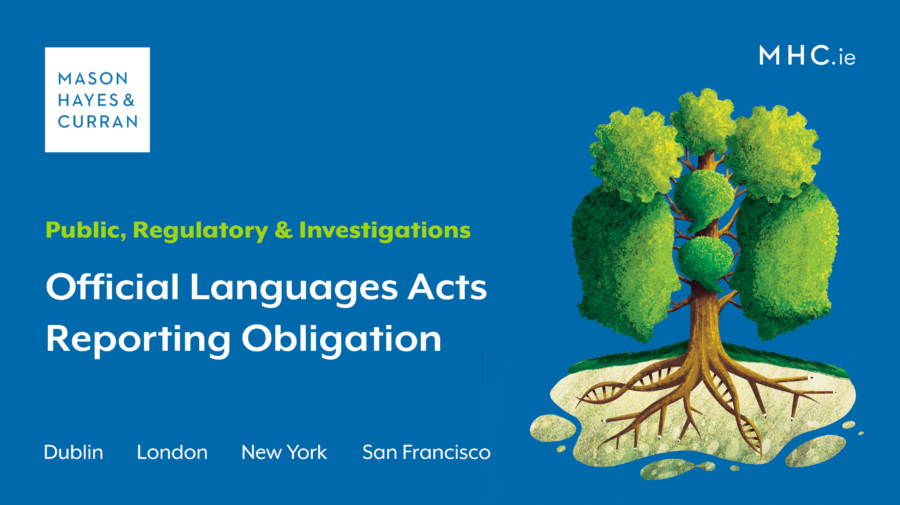Official Languages Acts Reporting Obligation

The Official Languages (Amendment) Act 2021 introduces further obligations for public bodies on the promotion and use of the Irish language. Section 4B requires public bodies to appoint a senior manager to report on the performance of obligations under the Official Languages Acts. Our Public, Regulatory & Investigations team reviews the implications for public bodies.
The Official Languages (Amendment) Act 2021 amends the Official Languages Act 2003. This legislation has been on the statute book since December 2021. The 2021 Act increases the obligations on public bodies to promote the use of the Irish language for official purposes. The 2021 Act has a mechanism, Section 4B, which is designed to ensure transparency and accountability regarding a public body’s compliance with these legal obligations.
This mechanism has recently come into operation. It requires the head of a public body to appoint a member of staff from senior management to report to the head on matters which relate to the obligations of the public body under the Official Languages Acts.
We consider the role of the person appointed under this section and some of the key statutory obligations which they need to consider
Appointment of senior manager to oversee compliance with the Acts
While on the statute book since 2021, Section 4B was only commenced by statutory instrument on 5 May 2023. Since then, the head of a public body is obliged to appoint a member of staff to oversee the public body’s performance of its obligations under the Official Languages Acts. The appointed person must be from senior management of the organisation. This is a mandatory appointment, and the role cannot be left vacant. The term “senior management” is not defined under the Acts and, rather unhelpfully, no qualifications or competencies or other requirements for the role are set out in the Acts. For example, it is not required that the senior manager have any particular proficiency in the Irish language. Therefore, a reasonable level of discretion is left to the head of the public body regarding the appointment. What is clear, however, is that the relevant person must be another member of staff, it cannot be the head themselves who fulfils the role.
The appointed manager has three mandatory duties:
- Oversee the performance of the statutory obligations of the public body under the Acts
- Report to the head of the public body on those obligations
- Ensure that a summary of any matters reported to the head of the public body are included in the public body’s annual report
The manner or frequency of reporting is not specified in the Acts. However, to prove compliance with the statutory provisions and for the appointed manager to prove fulfilment of their duties, it is recommended that the reports be in writing, rather than verbal. In that way a record of compliance is maintained. It is advisable that the written reports be made on an annual basis at least. Ideally, the reports would be more frequent, perhaps quarterly.
Section 4B(b) requires that a summary of any matters reported to the head of a public body by the manager appointed under Section 4B be included in the annual report of the public body. Section 4B(b) implies that there might be several reports of performance of the obligations made throughout the year which would be summarised at year-end. Section 4B(b) is not prescriptive, but it does suggest that the appointed manager report on the body’s obligations under the Acts and periodically report on any discrepancies.
The Official Languages (Amendment) Act 2021 introduces additional obligations on public bodies, some of which are intended to come into force over the coming months.[1] It is therefore advisable for the appointed manager to consider the following:
- Does the public body communicate with the public through social media?
- Does the public body advertise its products or services?
- Does the public body run marketing campaigns or communicate with the general public for the purpose of furnishing information to the public or marketing itself to the public?
- Does the public body plan to update its logo?
- Does the public body produce official forms?
- Does the public body have staff working in public-facing roles?
If any of the above considerations are relevant to a public body, then the appointed manager should examine in greater detail the requirements of the various Irish language obligations under the Acts.
If a public body fails to comply with the Acts, An Coimisinéir Teanga (the Language Commissioner) can take various actions regarding enforcement including:
- Investigation of a complaint,
- A statutory investigation
- The making of recommendations in a statutory investigation report, or
- Inclusion of the non-compliance in a report forwarded to the Oireachtas
Conclusion
The Department of Tourism, Culture, Arts, Gaeltacht, Sports and Media has committed to all the provisions of the Official Languages (Amendment) Act 2021 being in force by the end of 2023. Therefore, public bodies can expect significant developments regarding Irish language obligations in the coming months. To comply with the Official Languages Acts and to steer clear of the attention of An Coimisinéir Teanga, public bodies should ensure that they appoint a senior manager under Section 4B of the Acts. It is advisable for the senior manager to carry out an initial review of existing systems and processes to assess the level of compliance with the Acts. Following that review a report should be made to the head of the public body together with periodic reports throughout the year and culminating in a summary report for the public body’s annual report.
For more information and expert advice, please contact a member of our Public, Regulatory & Investigations team.
The content of this article is provided for information purposes only and does not constitute legal or other advice.
People Also Ask
What are Ireland’s official languages? |
In accordance with Article 8 of Bunreacht na hÉireann, the Irish language is the first official language with the English language being the second official language. The official languages referred to in the Official Languages Acts are Irish and English. However, while not an official language within the meaning of the Official Languages Acts, Irish Sign Language is recognised in Section 3 of the Irish Sign Language Act 2017. The State recognises the right of Irish Sign Language users to use Irish Sign Language as their native language and the corresponding duty on all public bodies to provide Irish Sign Language users with free interpretation when availing of or seeking to access statutory entitlements and services. |
What is the purpose of the Official Languages Acts? |
The purpose of the Official Languages Acts is to ensure the improved provision of public services through the Irish language. The Acts impose obligations on public bodies to promote the use of the Irish language for official purposes. |
For what organisations is the Official Languages Acts relevant? |
The Official Languages Acts apply to public bodies such as:
|
What are the main obligations of the Official Languages Acts? |
The main obligations under the act are:
|
[1] https://www.gov.ie/en/press-release/6c7df-commencement-of-other-sections-of-the-official-languages-amendment-act-2021-announced-by-ministers-martin-and-odonovan/
Share this:

Catherine Allen
Partner, Head of Public, Regulatory and Investigations
+353 86 382 1009 callen@mhc.ie
